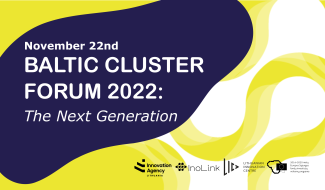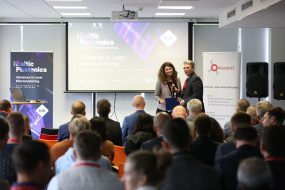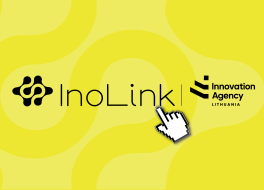BSR Cluster Manager Education Program empowers cluster improvement

This autumn cluster managers from the Baltic Sea region will gather to develop their competencies and gain new skills in a brand new international Cluster Manager Education Program. There are 7 representatives from Lithuanian clusters among the 26 selected training participants. All the up-leveling Lithuanian clusters participate in the Innovation Promotion and Development (Inolink) project implemented by the Agency for Science, Innovation and Technology (MITA).
The Erasmus+ project fills an obvious gap
Cluster management is a diverse and rather demanding activity, which requires a large set of different skills. Managers need specific knowledge of cluster management, cooperation between cluster members and partners organization, project initiation and coordination, strategic management, communication competencies, the necessary understanding of innovations created by big data and digital technologies and its risk management. There are over 230 active registered clusters in the Baltic Sea region but very few training opportunities available. According to the Inolink cluster project implemented by the Science, Innovation and Technology Agency (MITA) manager Jolita Razumienė, the lack of training programs is notable internationally.
Therefore, at the end of 2019 Lithuanian Food Exporters Association (Litmea) representing the SMART FOOD cluster together with Kaunas University of Technology and 5 other partners from Sweden, Finland and Germany started implementing a three-year Erasmus+ project. The main goal of this project is to define the role of cluster managers and improve the quality of cluster management in the Baltic Sea region by developing and providing a set of key training modules. The budget of the project is 409 thousand EUR.
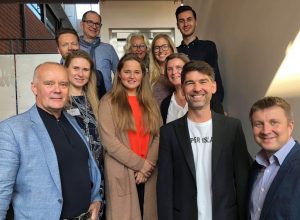
Project team
One of the project tasks is the development and implementation of the international cluster manager training program Cluster Manager Education. Its initiator, the head of focus area Energy and Cluster Manager of the Swedish NetPort Science Park Katarina Hansell, says that the set of training modules has been developed in sync with your cluster managers’ needs identified during the Erasmus+ project Cluster4Smart survey of 149 respondents. The lack of essential knowledge on cluster management and social ‘soft’ skills were among the mentioned top demands.
The estimated value of the training for the participant is 10,000 EUR, but thanks to the Erasmus+ program, which co-funds this project, 26 cluster representatives from Sweden, Germany, Finland, Poland, Denmark, Lithuania, Latvia and Estonia will participate free of charge and only pay for accommodation, travel and food expenses. 43 received applications were evaluated according to a motivation letter, work experience with the cluster, project management skills and cluster strength when the participants were selected. 7 participants from Lithuania will represent iVita, Smart IT, LITEK, LAuGEA, TOOLAS and SMART food clusters. All of these are successfully participating in the InoLink project, and 4 of them have been awarded the international Bronze Label for cluster management quality while others are still actively pursuing it.
’The value created and the maturity of the cluster mostly depends on both the competencies and motivation of the manager. Therefore, the active participation of the InoLink cluster managers in this selection for training is a good indicator of the Lithuanian cluster community potential,‘ J. Razumienė assesses the perspectives of Lithuanian clusters.
The modules of the program meet the needs of cluster managers
The program consists of four modules scheduled for the period from September 2020 to November 2021, developed and implemented by partners from Sweden, Estonia, Lithuania and Germany. Due to the limitations of COVID-19, the format of the program will change slightly with the first module taking place remotely. Other modules are planned to start and end with live cluster meetings whereas in-between ongoing seminars, mentoring activities and self-studies will proceed online.
According to Eglė Vaičiukynaitė, a researcher at Digitalisation Research Group and Erasmus+ Project Leader for Baltic Sea Region at Kaunas University of Technology, the Baltic Sea Region Cluster Education covers four courses.
’The Swedish representatives from Hyper Island are responsible for the implementation of the Collaboration & Leadership course, which includes the development of soft competencies of cluster managers. The content of the Strategic Management and International Business Environment course will be implemented by a team from University of Vaasa, Finland. The Digitalisation in Business course will be developed by researchers from Digitalisation Research Group at the School of Economics and Business, Kaunas University of Technology, Lithuania. Finally, the fourth – Scouting for Innovation – course will be organised by the Technical University of Applied Sciences Wildau in Germany,‘ says Vaičiukynaitė.
Digitalisation in Business course is being developed in Lithuania
Although many have heard of artificial intelligence (AI), big data (BD) and the Internet of Things (IoT), there is still lacking socio-economic and managerial knowledge on how to respond and make optimal use of the opportunities offered by digital technologies. Hence, the aim of the Digitalisation in Business course is to provide a clear understanding of how digital technologies and big data can be leveraged in business. During the course, cluster managers will not only gain specific knowledge but will also learn how to apply various digital tools in their daily business activities: to update their existing business models or to create new ones.
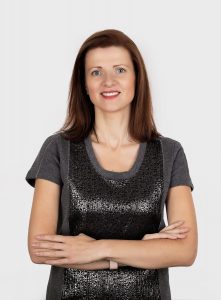
’In order to make strategic and creative decisions, it is necessary for cluster managers to understand the challenges of data and digital technologies and the possibilities of their use. During this module, cluster managers will get acquainted with the Industry 4.0 trends, and will learn how they change current business rules,‘ says Lina Dagilienė, the principal investigator of the Digitalisation Research Group and professor of School of Economics and Business, Kaunas University of Technology, Lithuania.
According to prof. Dagilienė, the Digitalisation Research Group researchers will introduce the risks, challenges and conditions of digital technologies – and also data management techniques required for digital innovation to benefit the business. The curriculum of the course will be based on global case-studies and business model innovations. ’In the end of the course, we will provide our students with a ’roadmap‘ on how to discover the digital potential of a business and what to implement for a particular cluster organisation,‘ says prof. Dagilienė.
International training supports not just knowledge acquisition opportunities
Assessing the international context every region operates as a kind of cluster. Some consortiums are formed by Western European countries: Spain, France, Portugal, Germany, others by the Benelux countries: the Netherlands, Belgium with neighboring countries. Another active bloc of cooperation combines Eastern European countries – Poland, Slovakia, the Czech Republic, Romania. Therefore, the Baltic Sea Region and especially the Nordic countries are very important for the Lithuanian cluster community.
Lithuanian Cluster Network president Giedrius Bagušinskas assumes that international training for cluster managers is relevant not only for knowledge acquisition – meetings and discussions in a multicultural environment broaden the horizons. It creates an ability to understand how clusters and their leaders in different countries work and reveal both how common problems and specific differences are discovered. ‘Advanced cluster leaders are always active participants in training and conferences because it is important for them to constantly refresh their knowledge and motivation and expand the contact circle,’ notes G. Bagušinskas.
For more details on the training, please see here
